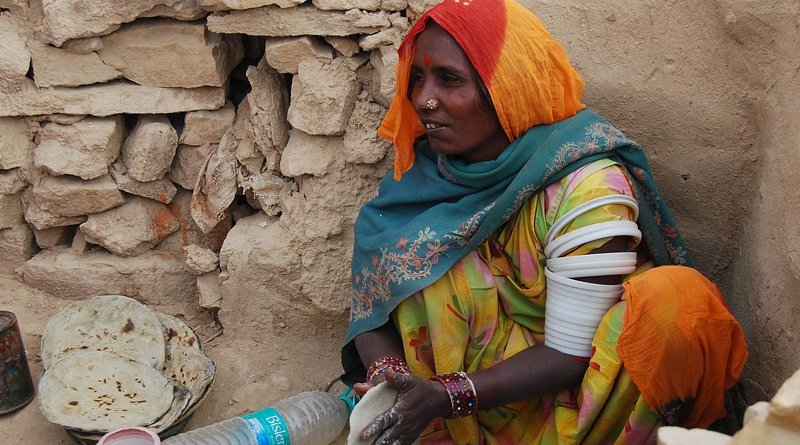A History Of Prejudice: COVID-19 And Domestic Work In India – Analysis
By IPCS
By Akanksha Khullar*
Domestic workers in India have historically struggled for visibility and formal recognition of their service category. While the challenges they face are long-standing, the COVID-19-related lockdown has brought these into sharper focus.
Ambiguous Guidelines
In the nearly two-month lockdown, anecdotal evidence reveals that many domestic workers have been abruptly dismissed, received pay cuts, have faced harassment or eviction from their rented accommodation due to inability to pay rent, and have subsequently lost their livelihood sustenance.
However, even with lockdown relaxations on physical movement now underway, many domestic workers continue to confront an uncertain future. This is largely because the lockdown guidelines issued by the central government did not clearly mention whether domestic workers could resume work, nor did they disallow it explicitly.
Admittedly, the government’s focus—at both the central and state levels—is, as it ought to be, on containing the spread of the virus, and addressing the severity of a crisis that has been compounded by resource scarcity. They are not expected to outline all specificities, and in a federal structure such as India’s, decision-making on secondary issues, in this, case domestic work, must be delegated. At the same time, it is important to acknowledge that it is precisely this lack of clarity that disproportionately disadvantages domestic workers. The guidance that anything not explicitly prohibited can be considered permissible leaves too much room for interpretation by local authorities to undertake their own measures.
As a result of the ambiguity, Residents Welfare Associations (RWAs) in several cities have been undertaking their own decisions regarding resumption of work for domestic workers. This pandemic is a unique situation, and once again, most of these RWAs are prioritising their own personal safety. They are acting within their right to interpret the guidelines as per their understanding. However, this is not to say that all their measures are reasonable, in keeping with governmental guidance, or uniform.
Some RWAs have imposed a ban on the entry of domestic workers into their localities even if all precautionary protocols are being followed. Others are allowing only those domestic workers travelling from green zones. In some cases, domestic workers are not allowed in unless they have downloaded the Aarogya Setu app on their phones, which fails to take cognisance of the fact that those currently not even making daily wages can ill-afford to purchase or own smart phones.
This then becomes a handover of responsibility, from the centre, to the states, and thereon to RWAs and individual employers.
A History of Prejudice
The vulnerability of domestic workers that has come to light during this lockdown in fact has a long history. This sector remains deeply steeped in a culture of servitude across South Asia, rather than employment of a contractual nature.
Most jobs that entail domestic work do not in practice involve formal employment contracts. This essentially leaves domestic workers outside the sphere of most regulatory frameworks of the sort that govern the organised sector. The 2008 Unorganised Workers Social Security Act which was intended to provide welfare and social security to unorganised workers has been found insufficient in terms of design, government implementation, and so on.
Currently, regulation is from the perspective of monitoring the domestic worker—such as police verification—and not necessarily to guarantee the worker his/her rights and protections. Some may be in possession of Aadhar Cards, but there is no clear data available on whether this is a significant number. A section of this workforce are migrants who moved from rural to urban areas in search of employment; some may be entirely undocumented. A majority live in rented premises without court registered leases, and thus lack valid residence proof, which is crucial for the issuance of almost every identity document, including ration cards.
Domestic work takes place in an unconventional setting, i.e. the household, unlike most other forms of labour market activities. Thus, the implementation of legalities that otherwise inform any kind of contractual employment poses an additional challenge. As a result, domestic workers often have to rely on the generosity of the employer. These circumstances can, directly or indirectly, make them vulnerable to poor working conditions, extended work hours, lack of job security, sexual or physical abuse, etc.
Another serious challenge for the promotion and protection of domestic worker rights is the historic economic devaluation of their work. Simply put, domestic work is not viewed as ‘real’ work. Instead, it is largely perceived as an extension of household chores that are not accounted for as contributors to a country’s economic growth.
Domestic workers have always been in a uniquely disadvantaged position in India, and South Asia. They continue to face hardships stemming not only from the informal nature of their employment, but the cultural prejudice towards this kind of work, and the subservience expected of those who undertake it. These issues predate COVID-19—the lockdown guidelines only served to exacerbate them, and bring them into greater focus. But, while there may be no villain in this specific case, there is a clear victim.
* Akanksha Khullar is a Researcher with IPCS’ Centre for Internal and Regional Security (IReS).

